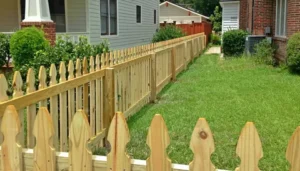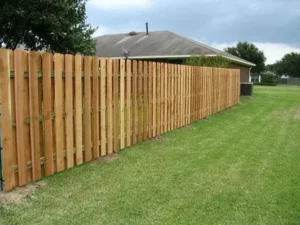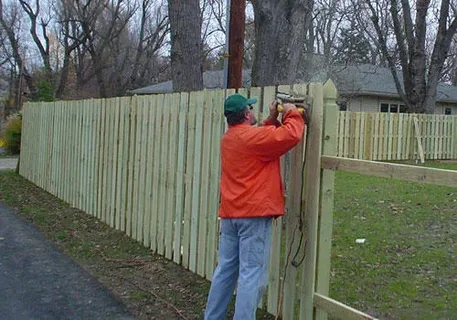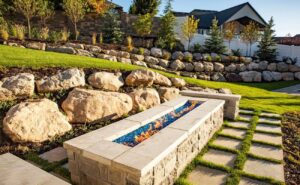A fence does more than mark a boundary. It provides privacy, security, visual appeal, and long term value. In Ontario, weather extremes icy winters, humid summers, and road salt demand fences that are strong, well-installed, and built for the local environment.
This guide explains what you need to know about fence installation in Ontario, including material options, processes, bylaws, seasonal care, and value considerations. It’s designed to help property owners make informed decisions and invest in fencing that performs for years to come.
Climate Challenges in Ontario
Ontario’s seasonal extremes can damage poorly installed or incorrectly chosen fences.
- Freeze-thaw cycles shift soil and can tilt or uproot fence posts.
- Snow and salt can corrode metal, stain wood, and weaken joints.
- Humidity and UV exposure can warp, crack, or fade materials.
To withstand these conditions, fences need:
- Posts set below frost line
- Treated or coated materials
- Season-specific design considerations
Only fences built with Ontario’s conditions in mind will retain their appearance and stability over time.
Choosing the Right Fence Material
Wood is a classic, customizable option. Cedar is naturally rot-resistant and attractive. Pressure-treated pine is affordable and long-lasting when maintained. Wood works well for privacy, gardens, and traditional home designs but requires periodic sealing and cleaning.
Metal options include aluminum, steel, and wrought iron. Aluminum is lightweight and rust-resistant ideal for decorative or ornamental fences. Steel and iron provide unmatched strength but must be coated to resist rust. Metal is ideal for security applications or high-visibility areas.
Vinyl and composite fences offer modern solutions with minimal upkeep. Vinyl is immune to rot and moisture damage. Composite mimics the look of wood but resists insects and UV. Both are ideal for homeowners who want durability without frequent maintenance.
Hybrid fences combine different materials, such as steel posts with composite panels. These solutions offer strength and aesthetic versatility, especially for properties requiring unique layouts or modern designs.
Professional Installation Process
Every fence installation begins with a consultation and site review. This includes:
- Measuring property lines
- Checking terrain and soil stability
- Identifying underground utilities
- Understanding zoning restrictions
After planning, the design is customized for your goals, property type, and city requirements.
During installation:
- Posts are drilled and set in concrete below the frost line
- Panels are secured using weather-resistant hardware
- Gates are aligned for smooth operation
- Finishing touches such as stains or coatings are applied
A final site cleanup and inspection ensure the project is complete, aligned, and built to last.

Ontario Fence Bylaws
Each Ontario municipality has specific fencing rules. For example:
- Toronto limits front yard fences to about 1.2 meters and backyard fences to 2 meters
- Corner properties may require visibility clearances near intersections
- Fences near sidewalks or driveways often need setback distances
Regulations may also specify acceptable materials, colors, or heights based on zoning. These bylaws prevent disputes, ensure safety, and preserve neighborhood aesthetics.
Working with professionals ensures your fence complies with all local standards and avoids costly changes or legal complications.
Seasonal Fence Maintenance
- Spring: Check for frost damage, loose posts, or rust. Clean off winter debris and re-seal wood if needed.
- Summer: Wash fence surfaces, especially if near traffic. Inspect for fading, cracking, or wear. Tighten loose fittings.
- Fall: Trim back nearby vegetation. Prepare for snow by checking structural integrity. Apply protective finishes before freezing temperatures.
- Winter: Avoid piling snow against the fence. Don’t lean tools or shovels on it. Watch for ice buildup on gates or latches.
- Regular care extends fence life, protects your investment, and keeps the structure safe and attractive.
Fence Installation Costs in Ontario
Costs depend on material, fence height, layout complexity, and site conditions. Pressure-treated wood is typically the most affordable. Cedar, aluminum, vinyl, and composite are more expensive but offer added durability or lower maintenance.
Additional factors include:
- The number of gates and their hardware
- Decorative elements like lattice tops or post caps
- Access difficulty, such as slopes or obstructions
- Required permits or inspections
Quality installation costs more upfront but saves money long-term by reducing repairs and replacements.
Benefits Beyond Boundaries
Installing a fence delivers more than security. It defines outdoor space, reduces noise, and can make properties more functional and appealing.
For families, fences protect children and pets. For homeowners, they improve outdoor living privacy. For businesses, they enhance security and create a professional appearance.
A well-chosen and properly installed fence can:
- Increase property value
- Improve curb appeal
- Signal care and investment
- Reduce time on market during resale
Whether you’re enclosing a backyard, securing a commercial lot, or designing for aesthetics, the right fence adds both function and form.
Why Work With a Professional Team
Expert installers bring knowledge of materials, tools, safety, and compliance. A trained team will:
- Recommend materials suited to your goals and site
- Manage permit applications and approvals
- Avoid errors like shallow posts, poor drainage, or boundary violations
- Guarantee craftsmanship and provide aftercare guidance
Professional fencing also means clear timelines, accurate quotes, and long-term warranties. Most importantly, it removes the stress of guesswork, DIY risk, and regulatory confusion.

Common Questions About Fence Installation
Do I need a permit?
In most Ontario cities, yes especially for taller fences or those near sidewalks or roads. Professionals handle the paperwork and ensure compliance.
Can I install a fence in winter?
Yes, with the right tools and frost-adapted techniques. It may take slightly longer but remains fully feasible.
How long does a fence last?
With proper materials and care, fences typically last 15 to 25 years. Composite and aluminum fences may last longer.
What’s the best fence for privacy?
Solid wood or composite panels provide complete privacy. Metal and vinyl can be adapted for semi-private designs.
When is the best time to install?
Spring through fall is ideal, but winter installations are possible. Booking early can help avoid seasonal wait times.
Begin Your Fence Project Today
A fence should do more than stand. It should withstand Ontario’s climate, meet legal standards, and reflect your property’s style.When built right, it becomes an asseta blend of security, beauty, and peace of mind.
Ready to design your fence? Get started today with a consultation and personalized quote. Let professionals handle the hard work so you can enjoy the results for years to come.



